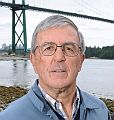LEADING CHANGE IN BRITISH COLUMBIA: “The Town of Gibson’s demonstrated commitment to achieving a shared vision regarding the role of natural assets in providing core municipal services is vitally important to the Partnership’s capability to carry out our mission” – Partnership for Water Sustainability recognizes Town as one its Champion Supporters in a presentation to Mayor and Council (September 2020)

“This award is really recognition of our staff, in particular our CAO, and the work that he and others have done in this very important area. The current Council was elected in 2018 and we are continually being educated in terms of natural assets and natural assets management. It is a true feather in the cap of the Town of Gibsons that we are getting recognition outside the community. At some point, I hope that (the Town’s accomplishments) will be recognized as strongly within the community. There is still work to be done in that area,” stated Mayor Bill Beamish.










